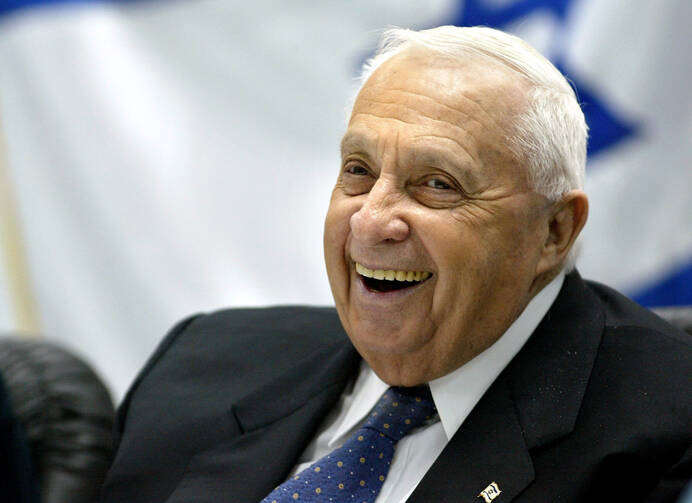Picking his words with some care during a memorial service in front of Israel’s Parliament building in Jerusalem, Vice President Joseph R. Biden Jr. said today of Israel’s former prime minister Ariel Sharon, “Like all historic leaders, all real leaders, he had a North Star that guided him.”
Sharon’s “North Star,” said Biden, “was the survival of the state of Israel and the Jewish people wherever they resided.”
Biden acknowledged that Sharon’s “actions earned him controversy and even condemnation,” but added, “he seemed never in doubt.” Sharon was "a complex man," according to Biden, who “lived in complex times in a very complex neighborhood."
Nicknamed in life both "the Bulldozer" and "the Butcher of Beirut," Sharon died Saturday at 85 after eight years in a state of minimal consciousness. Sharon was felled by a stroke in 2006 that ended his efforts to contain the Israeli-Palestianinan conflict as the Israeli prime minister. Sharon had controversially expanded settlements in the occupied territories then just as controversially abandoned them on the Gaza Strip, at different points in his life enraging, alarming or surprising friends and foes alike.
British Prime Minister David Cameron on Saturday called Sharon “one of the most significant figures in Israeli history and, as prime minister, he took brave and controversial decisions in pursuit of peace, before he was so tragically incapacitated."
Sharon was remembered far less circumspectly at the New York based Human Rights Watch, which noted in a statement that “it’s a shame that Sharon has gone to his grave without facing justice for his role in Sabra and Shatilla and other abuses.”
Hundreds, perhaps thousands of civilians were massacred by Lebanese Christian Phalangist militias in the Sabra and Shatilla refugee camps in Lebanon over three brutal days in September 1982, during an Israeli incursion into southern Lebanon orchestrated by Sharon as Israeli defense minister. The massacre in the camps constituted war crimes, according to Human Rights Watch.
An Israeli commission of inquiry in 1983 found that Sharon bore "personal responsibility" for the massacre. Sharon had agreed that Phalangist militias “should be sent in” to the camps to round up remnant members of the Palestine Liberation Organization, despite the risk that they would massacre civilians in the camps in retaliation for the assassination of Lebanese president and Maronite Christian leader Bachir Gemayel. The militias killed between 700 and 800 people, according to Israeli military intelligence estimates. Other estimates put the death toll much higher, to at least 3,500 killed. According to H.R.W., the dead included infants, children, pregnant women and the elderly, some of whose bodies were found to have been mutilated.
The group added in its statement that Sharon also escaped personal accountability for previous massacres of Arab civilians—in 1953 his "retaliation" unit was responsible for a raid on an Arab village that left 69 people, including women and children, dead—and “for other alleged abuses, such as his role expanding settlements in the Occupied Palestinian Territory, prosecutable as a war crime." Sarah Leah Whitson, Middle East and North Africa director at Human Rights Watch added, “His passing is another grim reminder that years of virtual impunity for rights abuses have done nothing to bring Israeli-Palestinian peace any closer.” Whitson added, "“For the thousands of victims of abuses, Sharon’s passing without facing justice magnifies their tragedy."
According to some reports, at the time of his stroke—after years devoted to encouraging Jewish migration into Palestinian territory—Sharon was preparing a Gaza-like unilateral withdrawal from two-thirds of the occupied West Bank. Speaking with Al Jazeera, Israeli military journalist Yoaz Hendel, the head of Jerusalem's Institute for Zionist Strategies, said, "What he did in the Gaza Strip was a very pragmatic solution to a situation where you have a minority of Jews in an area where you have many, many Palestinians." Hendel called Sharon "the most pragmatic Israeli and the most Zionistic Israeli."
"He believed in the Zionistic idea and he believed that if you want to survive and to maintain and strengthen Israel, you need to be pragmatic in this neighbourhood."
“Some say that in the end he was ready to make concessions for peace, but we’ll never really know for sure because of the stroke,” said Georgetown University's Drew Christiansen, S.J., former America editor-in-chief and one-time director of the U.S. bishops' Office of International Justice and Peace. But what has become painfully clear since Sharon's incapacitation, according to Christiansen, are the results of the settlement policies he set in motion and continued with gusto by his predecessor Benjamin Netanyahu and which eight years after Sharon’s collapse have now "made peace virtually impossible."








